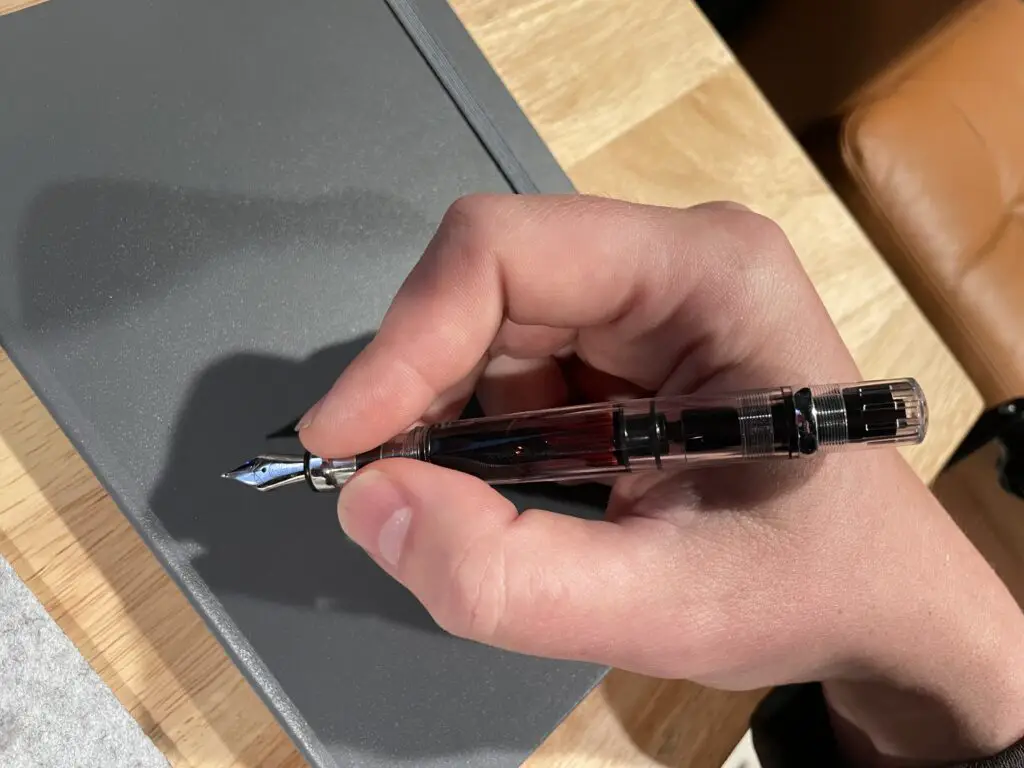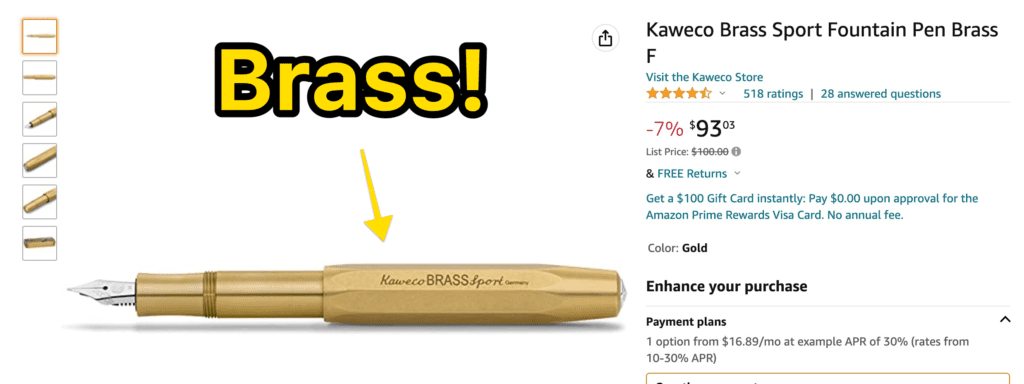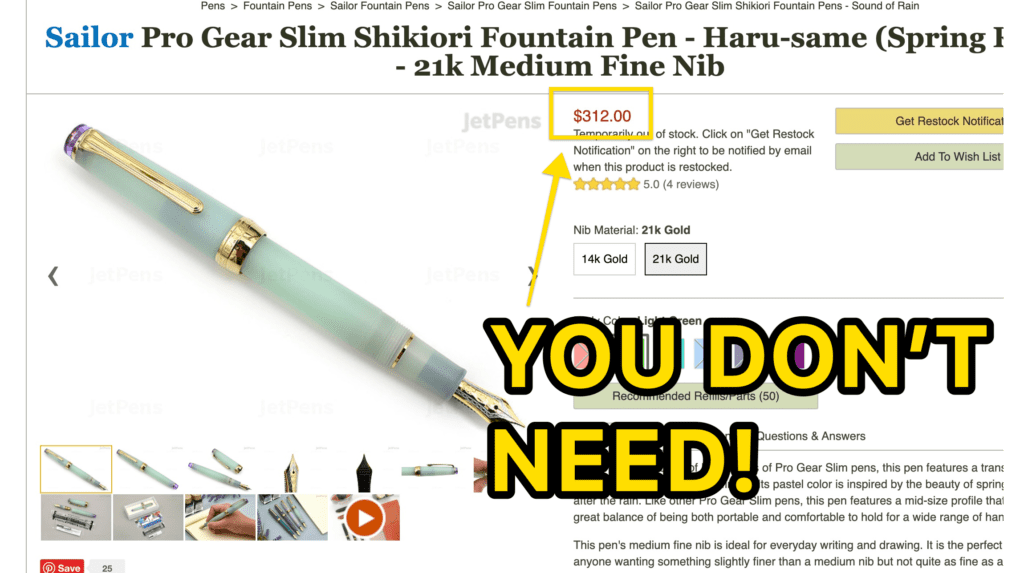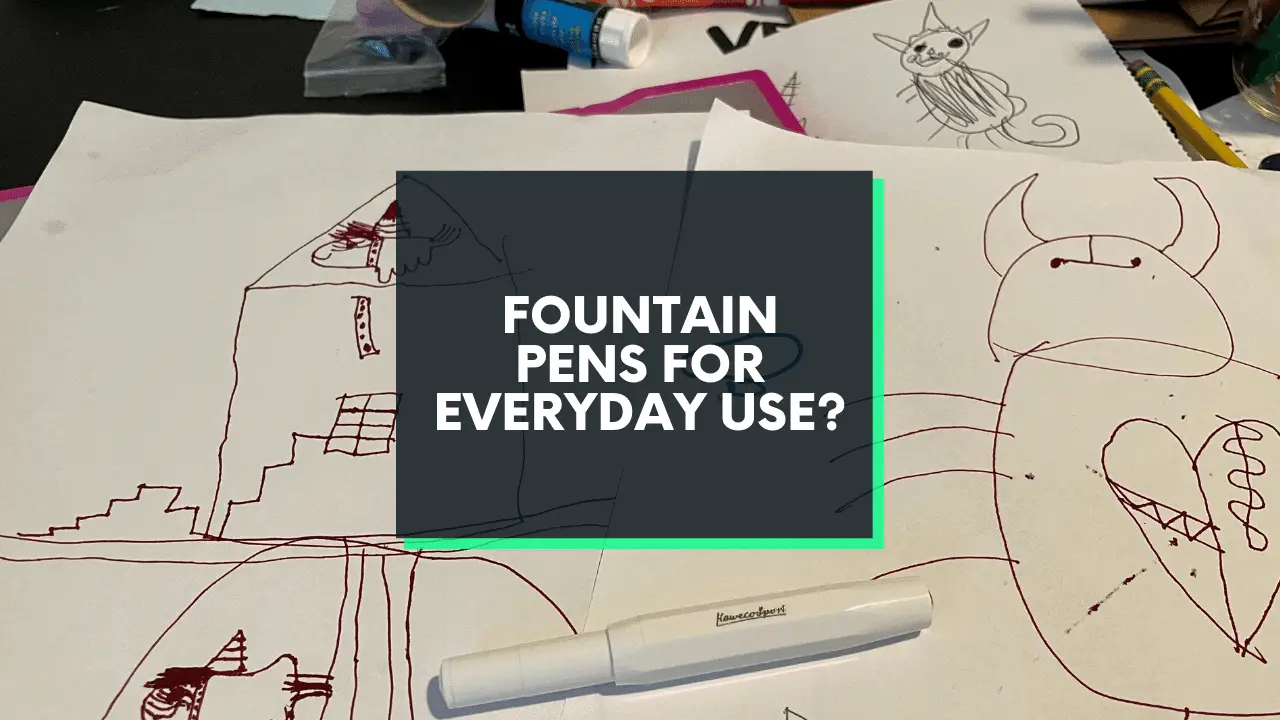It’s true, fountain pens are awesome and have TONS of benefits…
But are fountain pens good for every use?
Yes, fountain pens can be your main writing utensil for work or play! However, you’ll want to make sure to choose a fountain pen that works for your specific needs (size, weight, materials, nib size, and ink selection), as well as choose a thicker paper (80gsm+) that is suited for wetter inks (to avoid bleeding, smudges, etc).
I’ve used fountain pens exclusively for years now (I hate the experience of ballpoints now!), so let’s get into HOW and WHEN a fountain pen will make sense for you!
What is a fountain pen?
Simply put, a fountain pen is a pen that uses a metallic nib to apply the ink to the paper. The ink filling system (and ink reservoir) can be a disposable cartridge or a piston-filling system that uses an internal reservoir.

Fountain pens generally use “wetter” ink that is water-based and more liquid, allowing the ink to flow more easily. You don’t need to apply as much pressure when writing with a fountain pen!
Advantages of Using a Fountain Pen for Everyday Use
More Pleasurable Writing Experience
One of the biggest benefits of using fountain pens is their more pleasurable writing experience. Fountain pens don’t feel as scratchy or as harsh as ballpoint pens do. They’re also more comfortable to hold, since you can find fountain pens in various…
- Sizes
- Shapes
- Weights
- Materials
This makes it easier to find a pen that suits your hand and writing style.
More durable

Fountain pens are built to last a lifetime (seriously). They’re generally made with better quality materials, which means they can withstand more wear and tear.
And if you ever damage the nib, you can just replace the nib instead of having to replace the whole pen!
More economical & eco-friendly.
While a fountain pen will generally cost you more upfront, they will last much longer than a ballpoint pen. And you can refill the pen again and again with your favorite ink.
And since they’re built to last, there’s no need to keep cheap plastic pens that are meant to be thrown away. This goes DOUBLE if your fountain pen uses a piston (or a converter) to refill using bottled ink (as opposed to cartridges that you throw away).
They’re more fun (I mean, really)
They’re not only fun to write with (smooth!), but they’re also fun to collect!
There are a ton of fountain pens available in different colors, materials, sizes, and shapes, and there are also TONS of ink choices to try out and play with.
Once you start using fountain pens, you’ll be surprised at how much more enjoyable writing can be (and yeah–you’re not going to want to use a ballpoint pen ever again).
Disadvantages Of Using A Fountain Pen ❌
The ink CAN be messier
If you’re not used to using fountain pens, the ink can be a little messy. You’ll have to change up your writing style and be more deliberate with your strokes.
Fountain pens can also leak if you travel with them (unless you have a good pen case). So, you’ll want to take some precautions if you plan on bringing your fountain pen with you on the go, etc.
Check out this guide to storing fountain pens!
Fountain pens work best on thicker papers
Yes, technically fountain pens will work on any type of paper, but they work best on thicker papers (80gsm+). This is because the ink is wetter and can bleed through (but this will also depend on the nib size and ink!
You have a few options for using a fountain pen every day:
- Only use quality paper
- Use finer nibs (either Fine or Extra Fine, as these will leave less ink that will dry faster)
- Choose inks that will specifically dry faster and smudge less
If you’re looking for general paper suggestions, here’s what I recommend:
- Journal? Leuchhturn1917
- Notepad? Rhodia notepads
You can also find the heavier-weight paper at your local crafts store!
Requires More Maintenance
Fountain pens also require more maintenance than other pens. This is because you need to regularly clean the pen to prevent the ink from drying out and clogging the pen–and you’ll want to clean it periodically anyways.
(Honestly though, once you learn the ins and outs of your pen–this only takes a few minutes and isn’t difficult at all).
Can Be Costly
Fountain pens can also be quite costly. This is because they’re generally made with better materials and craftsmanship than other pens. So if you’re on a budget, a fountain pen may not be the best choice for you.

But then again, you can absolutely get fantastic fountain pens for under $20 (see our suggestions below!), and you only need to buy them once! They last a LOT longer than disposable pens.
Time Required For Learning
It takes some time to get used to writing with a fountain pen. So if you’re looking for an immediate replacement for your ballpoint pen, a fountain pen might not be the best choice for you.
The best (and worst) pens for everyday use:
Here are my personal recommendations for the best (and worst) pens for everyday use:
Best Pens:
- Lamy Safari – They’re cheap, built well enough, widely available, and write great (though they’re a bit on the scratchy side for me personally).
- TWSBI Eco – The TWSBI pens come with piston filling systems, which work really well (but you’ll have to use bottled ink, which is better anyways 😎)
- Kaweco Sport – These pens are smaller and easy to toss in your pocket! They are lightweight (which I don’t like), so if you’d like something that’s more durable, they also make the Sport in aluminum and brass! These are super popular in the fountain pen community
On the other hand, here are some fountain pens you’ll probably want to AVOID for everyday use:
- Pilot Vanishing Point pens – these pens feature a retractable nib (similar to ballpoint pens), but the mechanism is a bit finicky and can’t be trusted half the time. You want a RELIABLE pen, so stay away from these.
- A dip fountain pen – “Dip” fountain pens have the same kind of nib as traditional fountain pens, but they don’t have a reservoir for ink and require you to constantly dip the nib into an ink bottle. This is just too annoying for every day use.
- Any fountain pen over $200 – Why? Because you don’t want to lose it! Using an expensive pen could be fine if it ONLY lives in your office, etc, but if you regularly take it out and about with you, there’s a greater chance it could get lost or stolen (or broken, which you’ll have to pay fix).
Can you write normally with a fountain pen?
Yes, although the experience is slightly different if you’re coming from a ballpoint pen. You’ll have to adjust the pressure that you apply to the page, and also account for the different “wetness” of the ink. But once you get used to it, writing with a fountain pen is just as natural as writing with any other kind of pen!
Read this post for more info on writing normally with a fountain pen.
How often should I use my fountain pen?
You can use a fountain pen as often as you want, including everyday use! If you’re just switching from a ballpoint pen, though, you might want to take it slow at first and get used to the different style and feel of writing. But as long as you take care of your pen and keep it clean, you can use it as often as you like!
Final Thoughts – Can you use a fountain pen for everyday use?
Writing with a fountain pen might take a little while to get used to, but it’s something you’ll never regret once you’ve gotten used to it. And yes, you can absolutely use a fountain pen for everyday writing! Just make sure to do your homework to find the right pen and ink for you. With a little practice, you’ll be writing like a pro in no time!
And you’ll never want to go back to ballpoints or gel pens 😉
